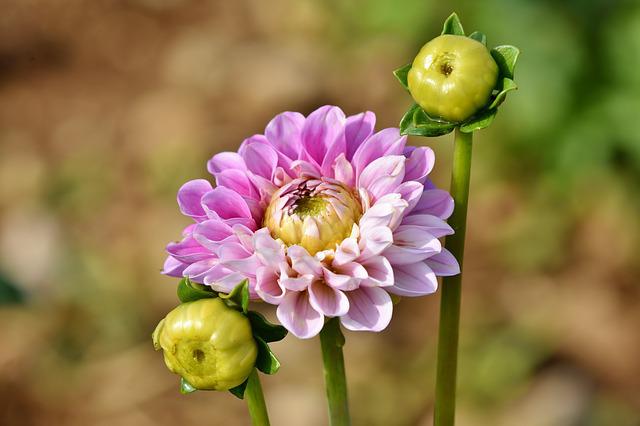Are Dahlias Poisonous to Cats? Know the Risks

Dahlias are highly toxic to cats but rarely fatal. According to the ASPCA, these flowers are toxic to nearly every species, including dogs and horses. 1 If humans consume enough of them, they may develop negative reactions.
Some cats, such as the young and the very old, may be more prone to problems than others. For example, those suffering from gastrointestinal issues may experience more severe symptoms.
Table of Contents
Dahlia Poisoning in Cats: What Causes It?
As mentioned earlier, which chemicals within the dahlia are responsible for producing the effects is unclear. However, the plant’s taxonomy can tell a few things about it. Dahlias belong to the Chrysanthemum family, as well as chamomile, which is also known as the Asteraceae family. For this reason, it probably contains similar compounds to those plants, such as volatile oils and acidic irritants. Cats’ nausea and aversion to food may be due to digestive upset brought on by the acids and essential oils that can negatively affect felines. In addition, cats who consume dahlia flowers experience cognitive and motor skill impairment in addition to dermatitis, which accounts for their listlessness and skin irritation.
What Are the Symptoms of Dahlia Poisoning in Cats?
Dahlia poisoning in cats is a serious condition and should be treated. The symptoms of this type of poisoning can vary, but they typically include the following:
- Nausea Vomiting
- Lethargy
- Discontinued or reduced eating
- Vomiting
- Wobbly steps Yawning
- Dilated pupils
- Red or irritated eyes
- Irregular movement patterns
- Ailments of the skin
It’s important to note that these are just some possible symptoms. Each cat will experience them differently; some may not exhibit any signs. For example, if your cat has experienced these symptoms, you must take them to its veterinarian as soon as possible for an examination and treatment plan.
Prognosis of Dahlia Poisoning to Cats
We’ve established that dahlia poisoning isn’t typically fatal to cats. Most cases have mild symptoms that can be managed with home observation. The duration of the symptoms is usually around 48 hours, but this varies from cat to cat.
Remember that even if your cat seems fine on the surface, that doesn’t necessarily mean they’re better. Instead, cats naturally hide their symptoms, so they may appear to act better when they are just mildly ill.
Most cats recover quickly from the effects of the toxins and are back to normal in no time. This is not a chronic condition and usually passes quickly.
Cats typically don’t need to see the vet unless they show signs of illness, but cats with more severe symptoms often do. Your cat may need more time to improve because of its severe symptoms. Unless there are serious complications, cats usually won’t need to return to the vet multiple times after they’ve been released.
In cats, the symptoms of a disease may be more severe. If this is the case, your veterinarian will probably want to keep an eye on your cat for a while longer. Chronically ill cats may have a more difficult time getting better.
Dahlia Poisoning in Dogs: First Aid
After inducing vomiting, administer activated charcoal through their feeding tube if available. Acetaminophen (Tylenol) can also be administered if the cat shows fever and pain. If your cat does not have a feeding tube, giving them fluids through a syringe directly into the stomach may be necessary.
If you cannot induce vomiting or if there has been extensive damage to the intestine from exposure to dahlias, surgery may be required for your cat’s intestines to regenerate.

When to Know If It’s an Emergency?
However, a trip to the vet may be in order if your cat starts vomiting excessively, refuses to eat for more than 24 hours, or acts extremely lethargic. The most pressing worry is that the cat will become dehydrated, which can lead to many other problems. Dehydration can be fatal in extreme cases.
Thus, it is not the dahlia toxins that cause serious illness but the dehydration from exposure. Fortunately, intravenous fluids can help your cat’s recovery by rehydrating them quickly.
If your cat seems healthy otherwise, taking it to the vet is probably unnecessary. However, cats still drinking water despite vomiting less frequently will likely recover quickly.
For this reason, it’s important to contact your vet whenever you have concerns about your cat’s health. The worst thing someone could tell you is to keep your cat under close watch at home and not bring it in.
Remedy for Cats Poisoned by Dahlias
Veterinarians typically begin fluid therapy for the cat as the first line of defense in treating poisoning. To counteract the dehydration caused by the cat’s vomiting, the vet can dilute the toxins in its system by administering fluids intravenously. Dermatitis should clear up quickly, and the animal’s energy levels should rise slightly. Therefore, the cat’s activity level should be restricted to rest and recovery for the first few days following the poisoning.
After an illness, your veterinarian may suggest a milder diet. It may take some time for your cat’s digestive system to heal; in the meantime, they may be more prone to stomach problems. But you shouldn’t feel obligated to switch up your diet constantly. Additionally, some felines may make a full recovery without any assistance.
